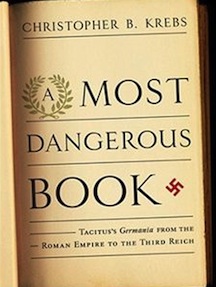By John Churchill
Not until the last line of the epilogue does the author of this chronicle of the discovery and uses of Germania acknowledge that “the Roman historian Tacitus did not write a most dangerous book; his readers made it so.” Indeed, the delicate irony of this story resides in the contrast between the fragility of the text itself, almost lost to worms and rot in a remote transalpine monastic library, and the terrible energy to which it contributed as a formative text in the creation of a self-understanding for a “deutsches Volk,” veering disastrously into the criminal horrors of National Socialism. In Tacitus’s text, the Nazis found what Barbara Tuchman called, in another context, “a distant mirror,” validating notions of the racial purity of blond athletes and warriors, simplicity of life, moral rectitude, and original possession of—indeed, identity with—a Fatherland. Tacitus thus supplied, though inadvertently, historical warrant for the self-conception that licensed Nazi atrocity. How Germania came to be at hand for that appropriation is Krebs’s tale.
The rhythm of the narrative is mixed. First, there is the detective story. By the time Italian humanists began to scour the monastic libraries of Europe for surviving classical texts, the neglect of the Dark Ages, comparatively a hiatus in the incessant re-copying necessary to save parchments from decay, had winnowed away innumerable works known through references. It must have been with delight, then, that Poggio Bracciolini wrote to a friend in 1425, “A certain monk, . . . , from some monastery in Germany, sent me a letter in which he writes that he’s found . . . works of Cornelius Tacitus heretofore unknown to us.” Krebs artfully pairs this scholarly joy with the anxious eagerness of Heinrich Himmler to lay hands on this very codex five hundred years later. And for the reader patient enough, he returns to the theme of contingency and survival with a late account of the near destruction of the codex in the flood of the Arno in Florence in 1966.
But survive Germania did, in the fifteenth century, and it began a career, as Krebs narrates in detailed scholarly sequence, as an influential document in the evolving self-understanding of German culture. The great tension, from the Middle Ages into the nineteenth century, lay between the political cacophony of the German kingdoms and principalities within the uncertain embrace of the Holy Roman Empire of the German Nation (emphasis, of course, added), and the pervasive but uneasy sense that somehow, in all this diversity of language, custom, religion, and politics, there was a German nation. And while surely there is a parallel story to be told of the emergence of a sense of national identity for virtually every European country, for Germany it was a Sonderweg, a different kind of journey. And one in which Germania played a big role.
Krebs’s unfolding of that role, seems at first glance like a who’s who of German cultural history in the late Middle Ages and early modern period. We read about Tacitus in the thought of Conrad Bickel, Philipus Cluverius, Philip Melanchthon, and Martin Opitz, and in the conversations of Frederick the Great. There is a detour to Montesquieu, and a return to Germany for commentary on J.G. Herder, J.G. Fichte, and Jacob Grimm. A French perspective returns through Tocqueville. Wagner makes his appearance, along with his son-in-law Houston Stewart Chamberlain, who turns out to have been as much a Frenchman as anything, though a stalwart spokesman for the German “volkisch”movement. It is perhaps notable, though, that conspicuous by their absence (a phrase we owe, it turns out, to Tacitus) are the real heavyweights of German intellectual history. Luther, Schiller, Goethe, Kant, and Hegel, appear barely, if at all, in this story.
What does appear, as the leading character, is the progressive incorporation of certain Tacitean characterizations of an ancient Germanic people into the self-understanding of a modern German nation. Tacitus gave Germany a history, an ancestry, and an identity. In the abstract, the elements of those characterizations might seem harmless; in the aftermath of the middle-20th century, they seem portentous with danger. Tacitus portrayed his tribes as of unmixed blood, that is, racially “pure,” and “resembling no one but themselves,” that is, set apart from the rest of humanity. They lived simply, but with a staunch morality. They were big of body, strong, blond, a tribe of warriors. They had not come from afar, but sprang from the very soil upon which they lived. Krebs writes: “In the formation of the core concepts of National Socialist ideology—racism, the ideology of the Volk and its spirit, and the selfsame Germanic myth—Tacitus’s Germania played a major role.”
Krebs’s work bears a variety of lessons. A couple of them are of purely historical interest, and valuable enough for all that: the detective story about fate of the text, and the scholarly tale about its uses, from 1500 on. But the big lesson is about the power of a text in the hands of people who believe it to be (1) authoritative, (2) about themselves, and (3) a conclusive warrant for policies that would, otherwise, be reprehensible. Germania is not alone.
John Churchill is Secretary of The Phi Beta Kappa Society. A Most Dangerous Book won Phi Beta Kappa’s Ralph Waldo Emerson Award for 2012.




